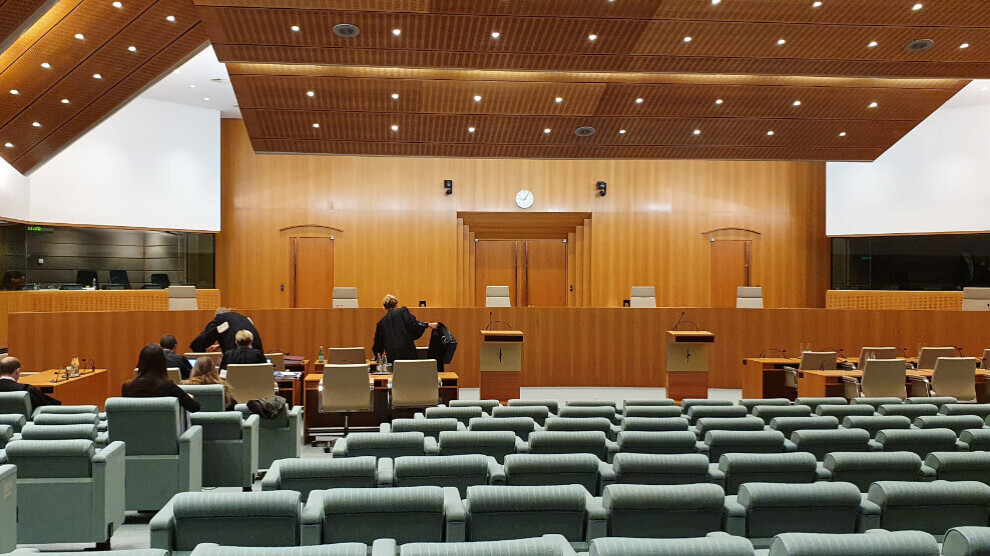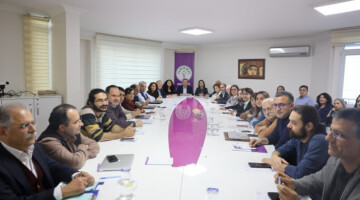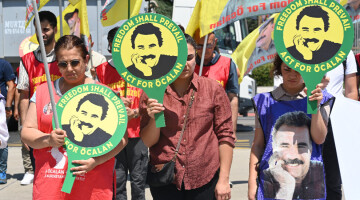The Court of Justice of the European Union met in Luxembourg on Thursday to rule on a long-running case involving the EU's classification of the Kurdistan Workers' Party (PKK) as a terrorist organization. The case has been pending for eight years. There is the European Union, the Council of Europe and the European Commission on one side of the case, and the PKK on the other.
The case dates back to 2014, when the PKK filed a lawsuit against the decision of EU states to include it in the "terror list." The PKK was put on the list in 2002 at the request of NATO member Turkey.
At the end of 2018, the European Union Court of Justice in Luxembourg ruled in favor of plaintiffs Murat Karayılan and Duran Kalkan that the PKK was wrongly included on the EU terror list between 2014 and 2017. The Court found the reasons for keeping the PKK on the list of terrorist organizations insufficient and canceled the lists between 2014 and 2017. In other words, the court found the arguments presented for the PKK's inclusion on the list "inadequate" and ruled that it could not be included in the list on these grounds.
The EU appealed the decision. Immediately after, the UK applied again in 2018 to keep the PKK on the list and the PKK was relisted on January 9, 2018, with the same arguments. The Kurdish side also filed a lawsuit against the new list on March 7 the same year.
The EU has used a similar method for other organizations before. If the list is updated after the court's decision, this new development will not be included in the file. The list is, in principle, reviewed every six months. However, this can sometimes take up to two years.
In the case heard in Luxembourg this Thursday, March 31, the EU's appeal and the PKK's case file against the lists after 2018 were combined.
The lawyers of the PKK insist that not only the PKK's military actions should be addressed, but also its social, economic and political dimensions. Lawyers especially point out that the PKK has a wide range of activities, from youth to children, women, nature and economy.
At the hearing, the defenses of the parties were heard. KONGRA-GEL Co-chairman Remzi Kartal and KCK Executive Council Member Zübeyir Aydar also attended the hearing.
THE PARTIES DEFENDED THEMSELVES
Attorney Tamara Bruma, representing the PKK, stated that after an eight-year trial, they will see the issue from the ground up today. Recalling the ruling in 2018, Bruma stated that the PKK has never denied its actions against military targets. Mentioning a list of "actions" submitted by the opposing party, Bruma noted that no evidence could be presented that these were "terrorist" acts.
While emphasizing that the "action" list submitted for 2019 is military targets, defining it as part of an armed conflict.
The lawyer for the Council of Europe claimed that "one terrorist act was enough" but did not elaborate. Insisting that "The PKK's inclusion on the list of terrorist organizations is justified," the lawyer took the risk of "terrorist action" as a basis.
Upon a question from the court judge, the PKK's lawyer Bruma demanded that the charges regarding the 2019 ruling and the mentioned actions be dismissed.
REQUEST BY THE COUNCIL OF EUROPE WAS REJECTED
The Council of Europe also argued in court that the PKK's lawyers are ineligible to represent the organization. The court's judge deemed the Council of Europe's request to be meaningless and dismissed it.
The court's judge posed many questions to the parties. The judge requested the lawyers to expand on their claims that armed resistance to a repressive administration should not be automatically classified as "terrorist." Lawyer Tamara Bruma emphasized that not all actions in an internal armed struggle can be labeled "terrorist," adding that the goal of the conflict is to democratize the country.
The Council of Europe responded by claiming that it was the PKK, not the Kurdish people, which is the issue at hand. At 11:30 a.m., the President of the Court took a half-hour break.
AYDAR: WE ARE RIGHT
KCK Executive Council member Zübeyir Aydar told ANF during the hearing that, "The matter has been going on for eight years. There is a constant exchange of information. The Court of Justice ruled in our favor in 2018, but the Council of Europe opposed."
Aydar stated that the lawsuit in question was combined with the PKK's lawsuit against the following lists, and that the court would make its verdict after a single hearing.
Regarding the importance of the case, Aydar said: “The reason is that the Kurdish independence struggle is being falsely accused of terrorism. This is a case in which the European Union is being sued. If, like before, the decision goes in our favor, the list should utterly collapse. We object to the fact that the lists are still reissued every six months. Another file is constantly being worked on. The case is incredibly significant to us. We are hoping for a positive outcome. We are right. The opposite side is wrong. They are trying to charge us of terrorism using the Turkish state’s justifications. This list has already been compiled solely in the interests of inter-state cooperation.”
'COPY AND PASTE’ REACTION FROM THE JUDGE
As the hearing resumed at 12:00, the president of the court asked the impression that the Council of Europe had not taken into account the court's decisions. The judge said that the Council of Europe can appeal against the decisions, but "it is surprising that the Council made a copy-paste objection to a decision that the Court has annulled." The judge stressed that the Council of Europe should respect the decisions.
THE RIGHT TO SELF-DETERMINATION DISCUSSED
The court also brought up examples of the right to self-determination, the PKK's goals, and conflicts in various regions of the world. One of the judges pointed out that the United Nations had acknowledged Polisaro's right to self-determination in particular. When looking at the Kurds solely from a legal standpoint, it was stated that no such decision had been made. In this case, the judge inquired about the legal context in which the PKK should be dealt with. The PKK's lawyer expressed satisfaction with the argument over whether the PKK can pursue the right to self-determination, adding that the absence of a UN resolution on Kurdish self-determination does not prevent the Kurds from exercising this right.
“The law applies to the situation,” said Tamara Bruma, while the judge emphasized that the lack of a UN resolution does not negate the existence of this right. Bruma retorted that the Council of Europe had already closed the door to such a debate.
The Council of Europe's delegate, on the other hand, justified it by arguing that the issue was about the PKK, not the Kurdish people. The court took a lunch break at that point. The hearing will resume at 14.30.













